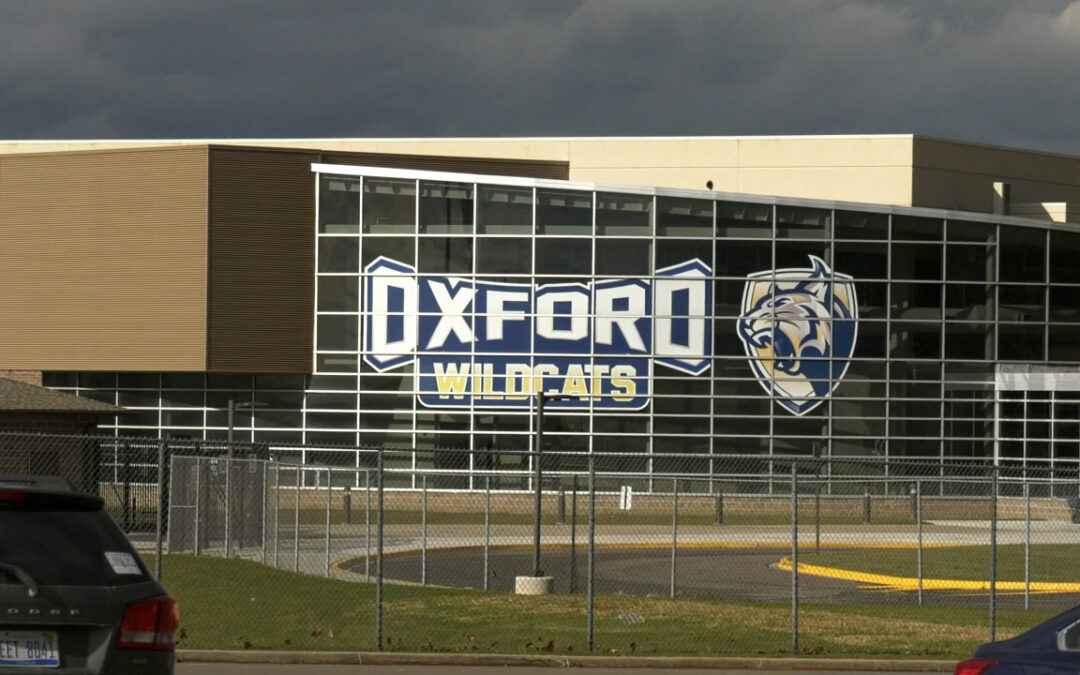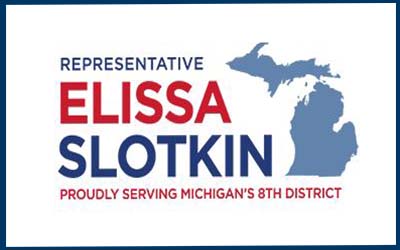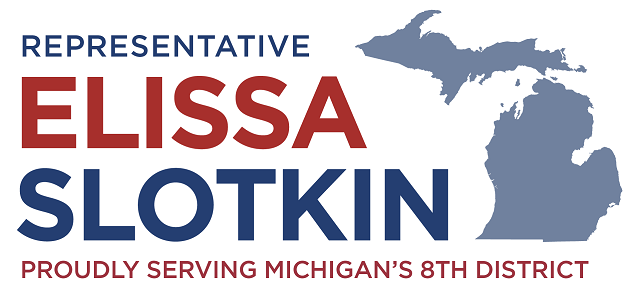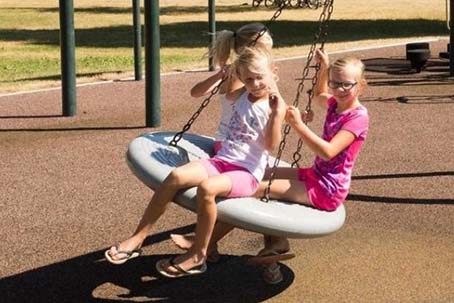
by orionontv | Oct 24, 2022 | Regional News
FOR IMMEDIATE RELEASE
October 24, 2022
Contact: [email protected]
Gov. Whitmer Statement on Oxford Shooter Pleading Guilty
LANSING, Mich. — Governor Gretchen Whitmer issued the following statement after the Oxford High School shooter pled guilty to all charges.
“My thoughts are with the students, teachers, staff, and families of Oxford High. I hope this outcome offers them some peace after last year’s horrific shooting.
“I want to thank Oakland County Prosecutor Karen McDonald for her hard work on this case, all the first responders and local law enforcement officials who responded to and investigated the shooting, and the countless community leaders—teachers, parents, and pastors—who brought the community together to heal.
“Also, I am grateful to the Michigan Legislature for their collaboration on bipartisan legislation to invest additional resources into Oxford Community Schools to help them hire mental health professionals, enhance security, and offer additional learning time to students in the wake of the tragedy.
“As Michiganders, we must do more to protect each other from gun violence. Let’s work together on background checks, secure storage, and red flag laws—commonsense gun violence prevention measures to keep our communities safe.”
Bipartisan Legislation on School Safety, Oxford Support
In June, Governor Whitmer signed legislation that fully funds risk assessments and critical incidence mapping at every school in the state to help protect students and create safety plans in the event of an emergency.
HB 6012 also delivered $10 million to Oxford Community Schools to help them recover from the November 2021 shooting. The funds will be used for personnel and additional student supports, including psychologists, family liaisons, mental health staff, school security, additional learning time, legal fees, and the physical restoration of a school building.
In July, Governor Whitmer signed a balanced, bipartisan education budget making the highest state per-student investment in Michigan history to improve every kid’s in-class experience. The budget sent $210 million to make schools safer and an additional $250 million to respond to student mental health needs, with every school receiving dedicated per-student funding—$214 for every kid in every district—specifically for campus safety and mental health.
These dedicated school safety and mental health dollars can be used by schools to hire more mental health professionals, harden buildings, and create an intervention system for students who are at-risk. The education budget also allocated an additional $25 million specifically for schools to hire more on-campus school resource officers.
How Michigan District Can Use Student Safety Funds
School districts can use funds from the budget to keep students, teachers, and staff safe. Districts have already started using resources to make several school safety investments, including:
Installing door security systems: providing an extra layer of security during lockdowns and assisting with barricading doors.
Testing emergency notification systems: ensuring effective lines of communication from every classroom to the main office or law enforcement and public safety officials.
Establishing school reunification sites: establishing procedure for pickup for all schools in the event of an evacuation.
Forming a safety committee: bring together a broad range of perspectives, thoughts, and ideas including but not limited to parents, teachers, staff, local law enforcement.
Increase collaboration with public safety departments: work closely with local law enforcement, strengthen relationships between teachers, staff, students, and public safety officials.

by orionontv | Oct 24, 2022 | Feature Writers, High School Sports

Written Sunday October 23rd at 7:40 PM
Here are my thoughts on the postseason matchups that were announced this evening. I will have more coverage on the podcast and more during the week so stay tuned everyone.
Birmingham Brother Rice at AVONDALE: There are some differences from last season compared to this season. This is a rematch of a 58-0 Warriors blowout win over the Yellow Jackets at Wisner Stadium last season. Avondale should be more prepared for Birmingham Brother Rice this time despite being a very tough matchup. This was expected with the winner likely to see Walled Lake Western in the next round.
FARMINGTON at Temperance Bedford: This is an awful matchup for Farmington. They have to travel south on I-275 to I-75 in Monroe County. The Mules are coming off a stunning 7-0 win over Saline two weeks ago. The Falcons have a solid quarterback in Dominic Peshi and running back Cam Pettaway. Either way this is a brutal matchup for Farmington.
FERNDALE at SEAHOLM: This is a very interesting matchup. The Eagles were the last team to get into the postseason in Division Two after winning 54-21 over St. Clair Shores South Lake last week. Seaholm has won five of the last six meetings over Ferndale. The Maples have lost two straight games to close the season. It’s a tough matchup for Ferndale going up against the veer but it’s an opportunity for the Eagles to see if they can matchup against a very good team.
Warren Mott at GROVES: The Falcons earned a big 14-7 win over Seaholm last week not only just to get into the postseason but they get a home game out of this. Groves couldn’t play Warren Mott in the postseason a few years ago because they played an ineligible player and had to forfeit that game. The Marauders really haven’t played the competition that the Falcons have so this is a great matchup for Groves in Beverly Hills.
TROY at SOUTHFIELD ARTS AND TECH: The Warriors got a great first round matchup with the Colts. Southfield Arts and Tech is riding with a ton of confidence heading into the postseason and is coming off a huge 28-21 win over River Rouge last week. Troy has not seen the competition or the quarterback like they will in Isiah Marshall. Expect their defense will be tested. It could be a long night for the Colts in this matchup.
Detroit Cass Tech at WEST BLOOMFIELD: I’m in absolute shock and in horror that the MHSAA unless this is media related which I think it is that they would send Detroit Cass Tech northwest to the Swamp to take on the Lakers. This game ended up being the “Ballys Sports Game of the Week.” The good news for West Bloomfield is that they should have Requan Nance and Semaj Morgan coming back but this is not the matchup that I expected them to get. At least the game is in the Swamp and not on the road.
ROCHESTER at STONEY CREEK: The Falcons have had their problems against their city rivals in Adams and Stoney Creek. They will get one of them in Stoney Creek. It is also a rematch of a 43-22 Cougars win over Rochester two weeks ago that game was also at Stoney Creek. There are a ton of storylines in this game as well especially with Coach Nick Merlo going up against alum school. Rochester needs to exercise their city demons. This could be a start.
LAKE ORION at ADAMS: This is a very interesting matchup and a rematch of two Red rivals. Not to mention that the Dragons and Highlanders met a few weeks ago in Lake Orion with Adams coming out on top 42-21. The Highlanders have been rolling on all cylinders ever since their loss to Clarkston. The Dragons really struggled against Saline. Lake Orion is a team that is playing with nothing to lose.
Lapeer at CLARKSTON: The Lightning have had a Wolves problem in the last seven meetings. This is a rematch of a 48-13 Clarkston rout of Lapeer two weeks ago. Ethan Clark had four touchdowns in that game. This game is at the Wolves Den which they have only played three games on their home field this season. If I’m the Lightning I am absolutely sick and tired of playing the Wolves and they get them again. If Clarkston wins this game then they could play Davison in the district finals.

by orionontv | Oct 20, 2022 | Regional News

FOR IMMEDIATE RELEASE
October 20, 2022
Contact: [email protected]
ICYMI: PBS NewsHour: What will the EV revolution mean for Detroit?
LANSING, Mich. – Since taking office, Governor Gretchen Whitmer has made historic investments to build on Michigan’s legendary manufacturing heritage, grow the economy, and put Michigan in the lead on future mobility. Whether investing in Michigan’s talented workforce to compete for the jobs of the future, building out charging infrastructure and lowering costs, or bringing supply chains back from overseas to communities in Michigan, Governor Whitmer will work with anyone and compete with everyone to make Michigan the epicenter of the new electric vehicle (EV) revolution.
What will the EV revolution mean for Detroit? | PBS NewsHour
Key Points:
Detroit and the global auto industry are on the cusp of a radical transformation. How the city and the industry navigate the electric vehicle revolution will have consequences for Detroit auto workers, car buyers and people across the nation.
[…]
For many automakers, a shift to electric vehicles means more investment in U.S. manufacturing. For Jeep, building EVs means investment in Detroit, Morrison explained.
The automaker has just opened a new Mack Detroit Assembly Complex, which is the first new automobile assembly plant in Detroit in nearly 30 years. Along with Jeep’s Jefferson North Assembly plant, these are the only two automobile manufacturing facilities completely within the Detroit city limits.
“We’ve employed 3300 new employees, all Detroiters,” Morrison said. “They’re working around the clock building the new Grand Cherokee. And it’s a great facility that is high-tech. It’s a great environment. You go in there and our workers have their Jeep hats on and Jeep backpacks. They’re part of the Jeep family.”
[…]
Michigan’s state government is intentionally and strategically using state EV-related programs and support to ensure that mobility solutions are implemented throughout the entire state, specifically targeting areas that have been overlooked in the past or are lagging behind the development of neighboring regions.
“A truly inclusive mobility ecosystem needs to be built as a resource for everyone, not just those in high-income or regularly traveled areas, and our state has made a conscious effort to ensure lower-income and underserved communities have the same mobility opportunities that other regions do,” Michigan’s Chief Mobility Officer Trevor Pawl told the NewsHour, “With EV mobility solutions available, we can better support residents as they move around to live, work and play while still enabling a world that is greener and more sustainable.”
In early October, Michigan Governor Gretchen Whitmer announced two new electric vehicle battery projects that she said will bring in almost $4 billion in capital investment and create almost 4500 new jobs in Michigan. According to the governor’s office, these jobs are part of 30,000 good-paying automotive jobs — from line workers to engineers — that Michigan companies have announced in the past four years as the state builds upon its experience in automotive manufacturing and moves toward mobility and electrification in the future.
Governor Whitmer’s Accomplishments
Governor Whitmer has helped Michigan build on its legacy and leadership in mobility. Since she took office, the state has announced over 30,000 good-paying auto jobs, with 15,000 auto jobs and $10 billion of investment in just the last 12 months alone.
Last year, Governor Whitmer worked across the aisle to enact a historic, bipartisan economic development package empowering Michigan to win big projects and create thousands of good-paying jobs. In addition to a $7 billion investment from GM, creating and retaining 5,000 jobs, and a $2 billion investment from Ford creating more than 3,200 jobs, Michigan has attracted the following investments in EV manufacturing:
- Gotion, $2.36 billion, 2,350 jobs: world-leading battery maker announces plant in Big Rapids, largest economic development investment in Northern Michigan ever.
- Our Next Energy, $1.6 billion, 2,112 jobs: Novi-based battery maker announces new factory in Van Buren Township, building supply chain in Michigan using more sustainable materials.
- LG Energy Solution, $1.7 billion, 1,200 jobs: manufacturer of large lithium-ion polymer battery cells and packs for electric vehicles quintuples production capacity at their Holland plant.
- Rivian, $4.6 million, 100 jobs: manufacturer of electric adventure vehicles builds state-of-the-art, high tech service support operations center in Plymouth.
- Magna, $70.1 million, 304 jobs: producer of complex structural battery enclosures for electric vehicles builds new facility in St. Clair.
- AKASOL, $40 million, 224 jobs: manufacturer of high-performance lithium-ion battery systems for commercial applications such as buses, commercial, rail and industrial vehicles, ships and boats builds battery facility in metro Detroit.
- FLO, $3 million, 133 jobs: electric vehicle charging solution company expects to produce 250,000 EV chargers by 2028, builds new facility in Auburn Hills.
- XL Fleet, $1.2 million, 49 jobs: high-growth commercial vehicle technology company focusing on developing and producing cutting-edge technology to convert conventional vehicles into hybrids establishes R&D center in Wixom.
|

by orionontv | Oct 20, 2022 | Regional News
 |
|
|
| Hi there,
I want to tell you a story about getting something done within our truly broken immigration system. It has to do with the H-2 visa program, which brings in legal, vetted workers to help seasonal industries like tourism and agriculture. Think Mackinac Island or seasonal farm work.
It also is a perfect example of how the partisanship surrounding immigration is holding back businesses around Michigan and dragging down our economy.
This isn’t a new issue for me – over the last few years in particular, I’ve heard concerns from small business owners in places like Mackinac Island and around our state about labor shortages during peak season. Not having enough workers has forced small businesses all over Michigan to shorten their hours and scale back service.
That’s why I’ve been pushing the administration to release more H-2B visas, particularly during the tourism high season, so more workers can come to the U.S. legally to help businesses keep their doors open and continue growing our economy. I’ve been making this request each year I have served in Congress, and at the beginning of the year, I urged the administration to release more of these guest worker visas, and I was pleased when they took that step.
Earlier this month, I wrote to Homeland Security Secretary Alejandro Mayorkas and Labor Secretary Walsh asking them to speed up the H-2B process – which can often take months and leaves our businesses in limbo. Last week I learned that they’ve taken my recommendations and plan to the maximum number of visas for this fiscal year.
This is going to be a huge boost for Michigan’s seasonal businesses. It will enable them to hire the workers they need to stay open and well-staffed during their busiest seasons, and ensures Michiganders visiting Mackinac or patronizing other businesses don’t have to worry about unexpected closures or delays.
As I’ve said many times, our immigration system is broken and both parties share blame for politicizing this issue. But the announcement of these additional visas shows that when we key our immigration policy to our economic needs, we can support legal and safe immigration – instead of illegal, dangerous border crossings – and American businesses can thrive.
– Rep. Elissa Slotkin |
|

by orionontv | Oct 20, 2022 | Regional News
|
|
 |
DNR News
|
|
Oct. 20, 2022
Contact: Dan Lord, 517-290-5603 or Alex McBride, 517-242-3007
Michigan Spark Grant applications open Monday; up to $15 million available for outdoor public recreation projects
Interested applicants invited to register for Oct. 28 information webinar
 It’s a milestone moment for outdoor recreation in Michigan: first-round funding of the $65 million Michigan Spark Grants program will start accepting applications Monday, Oct. 24. It’s a milestone moment for outdoor recreation in Michigan: first-round funding of the $65 million Michigan Spark Grants program will start accepting applications Monday, Oct. 24.
The program is aimed at helping local communities that want to create, renovate or redevelop public outdoor recreation opportunities for residents and visitors—especially those communities whose economic opportunities and health were hardest hit by the COVID-19 pandemic.
Up to $15 million is available in the first round of the program, administered by the Michigan Department of Natural Resources.
Michigan Spark Grants are for projects that provide safe, accessible, public recreation facilities and spaces to improve people’s health, introduce new recreation experiences, build on existing park infrastructure and make it easier for people to enjoy the outdoors.
The grant opportunity is possible because of the Building Michigan Together Plan, signed in March 2022, which included a historic infusion of federal funding in our state and local parks.
“We’re excited and extremely privileged to launch a program that we know will help many deserving communities expand outdoor recreation resources and experiences for their residents,” said DNR Director Dan Eichinger. “Throughout the COVID-19 pandemic, people turned to the outdoors in record numbers for fresh air and space to stretch out. Having such opportunities close to home is critical, and that’s what Michigan Spark Grants will make possible.” |
Eichinger outlined the program today during the Michigan Municipal League’s annual convention in Muskegon.
The league’s director of state and federal affairs, John LaMacchia II, said the occasion was fitting, as more than 400 local leaders from across Michigan have gathered together to learn about opportunities for investment that will improve their communities.
“Providing robust and equitable access to parks and recreation opportunities is one of the key elements to improving quality of life,” LaMacchia said. “The Michigan Spark Grants program will provide our members access to critical funding that will help them invest in durable assets that contribute to the social and economic fabric of a community.”
LaMacchia is a member of the advisory group that provided the DNR with input on the program’s intent, scoring criteria and application requirements – all to ensure the program’s stated objectives are met.

Developing the program
Andrea LaFontaine, executive director of the Michigan Trails & Greenways Alliance, also serves on that Michigan Spark Grants advisory team.
“United by the belief that all Michiganders deserve quality outdoor recreation experiences close to home, the Michigan Spark Grants advisory team worked together to build an opportunity that maximizes resources, provides support and removes barriers to access,” LaFontaine said. “The Michigan Trails & Greenways Alliance was honored to serve on this committee, and it is our hope that Spark Grants help ignite greater investment in outdoor recreation amenities throughout the state.”
Advisory team members represented diverse perspectives including private philanthropy, regional planning, parks and recreation, community foundations, local governments (rural and urban), and federal and state grant programs.
In addition to LaFontaine and LaMacchia, they include:
- Kyle Caldwell, Council of Michigan Foundations.
- John Egelhaaf, Region 4 Southwest Planning Commission, Michigan Association of Regions.
- Dan Lord, Michigan Department of Natural Resources.
- Amy Matisoff, Michigan Department of Transportation.
- Clay Summers, Michigan Recreation & Park Association.
- J.J. Tighe, Ralph C. Wilson, Jr. Foundation.

Program details, eligibility
Eligible Michigan Spark Grant applicants must be entities that are legally constituted to provide public recreation and can include:
- Units of government or public authorities.
- Federally designated tribes.
- Regional or statewide organizations.
- Consortiums of local units of government or public authorities.
A total of $65 million of coronavirus state and local fiscal recovery funds was made available through Public Act 53 of 2022. Individual grant amounts range from a minimum of $100,000 to a maximum of $1 million and are scheduled to be distributed in three rounds:
- Round one: up to $15 million during the week of Jan. 30, 2023.
- Round two: up to $25 million in spring 2023.
- Round three: up to $25 million in summer 2023.
First-round grant applications must be submitted by Dec. 19, 2022.
Oct. 28 webinar
Applying for a grant can feel overwhelming. To help prospective applicants better understand program particulars – including eligibility, documentation, deadlines and more – they are invited to participate in a free informational webinar offered 10:30-11:15 a.m. Friday, Oct. 28.
It’s a great opportunity to ask questions and learn more about how to make the Michigan Spark Grant application process manageable, even with a busy schedule. Registration is required. For those who can’t join the webinar live, a recording will be shared online, when finalized.
For more information, including the program handbook, scoring criteria, FAQs, sample site plans and other resources, visit the Michigan Spark Grants webpage. |
|










 It’s a milestone moment for outdoor recreation in Michigan: first-round funding of the $65 million Michigan Spark Grants program will start accepting applications Monday, Oct. 24.
It’s a milestone moment for outdoor recreation in Michigan: first-round funding of the $65 million Michigan Spark Grants program will start accepting applications Monday, Oct. 24.

